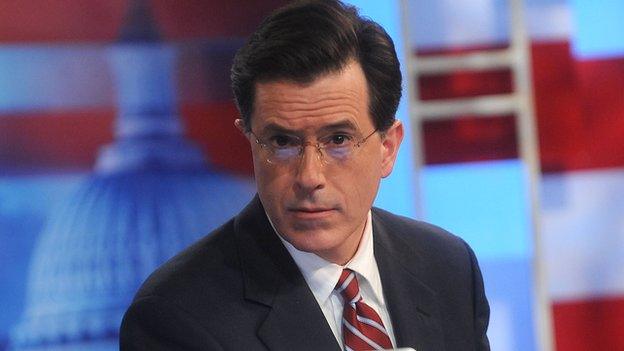Five things to know about Stephen Colbert
- Published
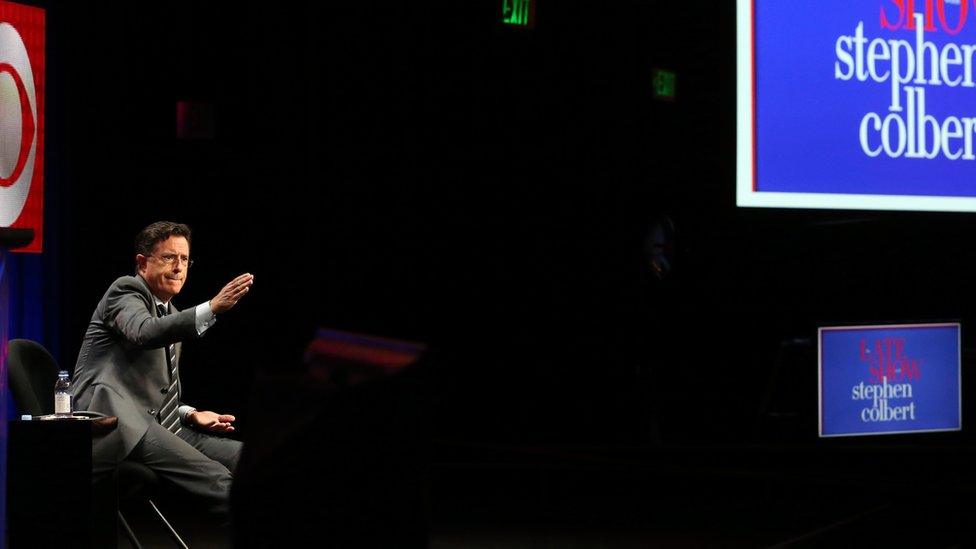
Stephen Colbert, the new host of The Late Show on CBS, is one of the best-known and least-known figures in late-night US television.
For nine years Colbert, masquerading as a self-obsessed conservative talking head, held court on his Comedy Central show, The Colbert Report. At times his act was so convincing it was difficult to tell whether his guests were playing along or taking his over-the-top quips and opining at face value.
Now Colbert is stepping out from behind his previously ubiquitous persona and replacing late-night legend David Letterman. As US television audiences get their best look at the "real" man this week, here are five things to keep in mind.

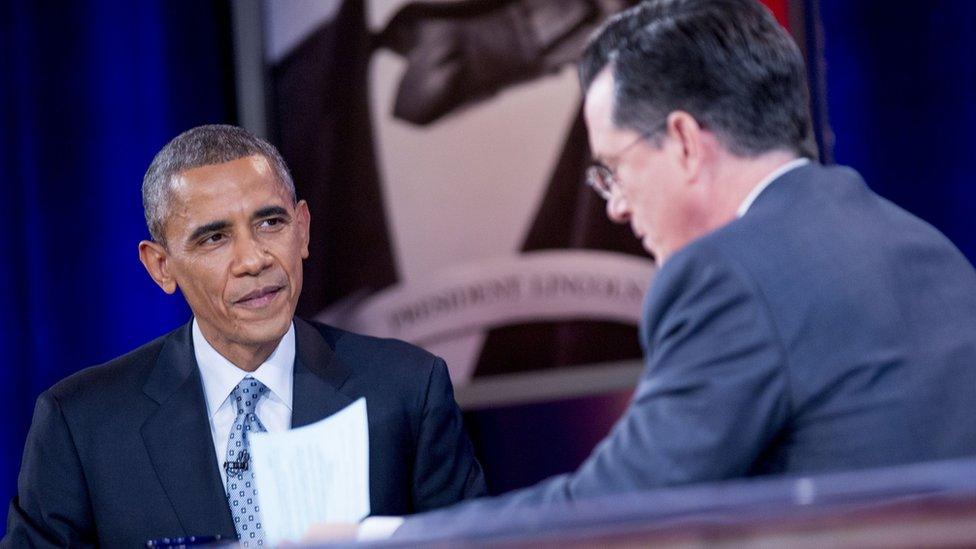
A Colbert interview has been a challenge for politicians big and small
He's a political animal
Politics was Colbert's bread and butter on the Colbert Report. He took particular relish in meeting with - and poking fun at - some of the lesser lights in the political fixture.
During the 2008 and 2012 elections, presidential candidates of all stripes paraded onto his show. Some, such as former Arkansas Governor Mike Huckabee, became official "friends of the show", in Colbert's words.
His Better Know a District segment featured interviews with members of Congress - many of whom seemed to have little idea what was in store for them. He coaxed California's Brad Sherman to talk like a robot, asked Florida's John Mica if he had to remove his toupee to go through airport security and combed New York's Eliot Engel's prodigious moustache.
Although new Democratic members of Congress were once advised, external to steer clear of the show, Colbert often boasted of a "Colbert bump" - a boost in support for politicians who made appearances. One study found Democratic candidates received a 44% boost in fundraising following a spot on the Report.
A look at Colbert's guest list for his new show reveals that, despite the change of venue, politics will still be front and centre - and, with a presidential campaign season in full swing, he'll have plenty of material.
Republican presidential hopeful Jeb Bush, Democratic candidate Bernie Sanders and Vice-President Joe Biden all are scheduled to appear in the first two weeks.

He's fearless
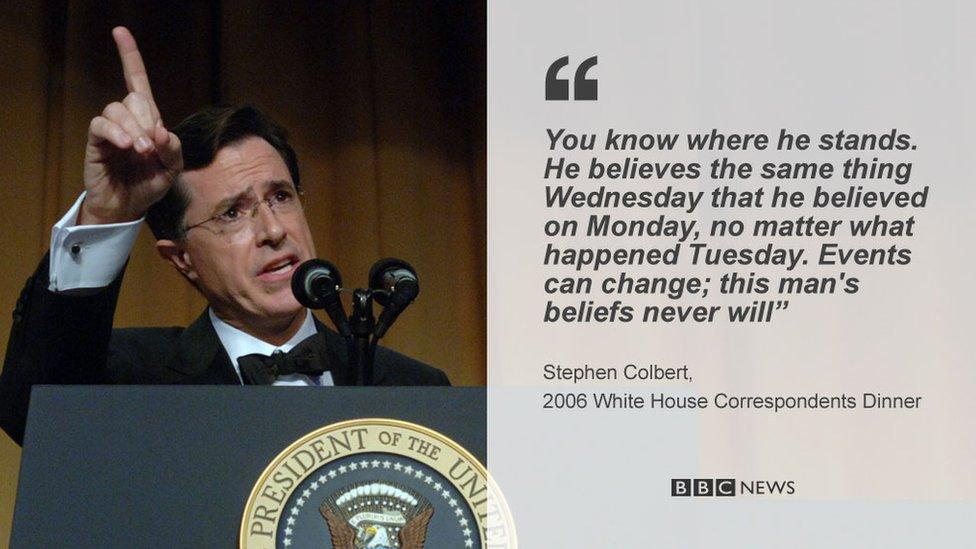
Colbert mocked President George W Bush - and the media - during the 2006 correspondents dinner
In 2006 Colbert delivered the monologue at the White House Correspondents Dinner - a role typically reserved for traditional comedians delivering safe, unthreatening one-liners.
Instead Colbert proceeded to skewer President George W Bush, who was seated nearby, and the entirety of the Washington press corps in attendance.
"I stand by this man, because he stands for things," Colbert said of the president. "Not only for things, he stands on things - things like aircraft carriers and rubble and recently flooded city squares. And that sends a strong message, that no matter what happens to America, she will always rebound with the most powerfully staged photo-ops in the world."
As for the press, he told them: "Here's how it works. The president makes decisions. He's the decider. The press secretary announces those decisions, and you people of the press type those decisions down. Make, announce, type. Just put them through a spell check and go home."
In the days after the speech, much of establishment Washington brooded over the insults. "Colbert was not just a failure as a comedian but rude," sniffed, external Washington Post columnist Richard Cohen.
Colbert's fans loved him for it, however, and the moment helped cement his rise as political agitator.
"I just want to do things that scratch an itch for me," Colbert said in a recent interview, external with GQ magazine. "That itch is often something that feels wrong. It's wrong because it breaks convention or is unexpected or at times uncomfortable. I like that feeling."
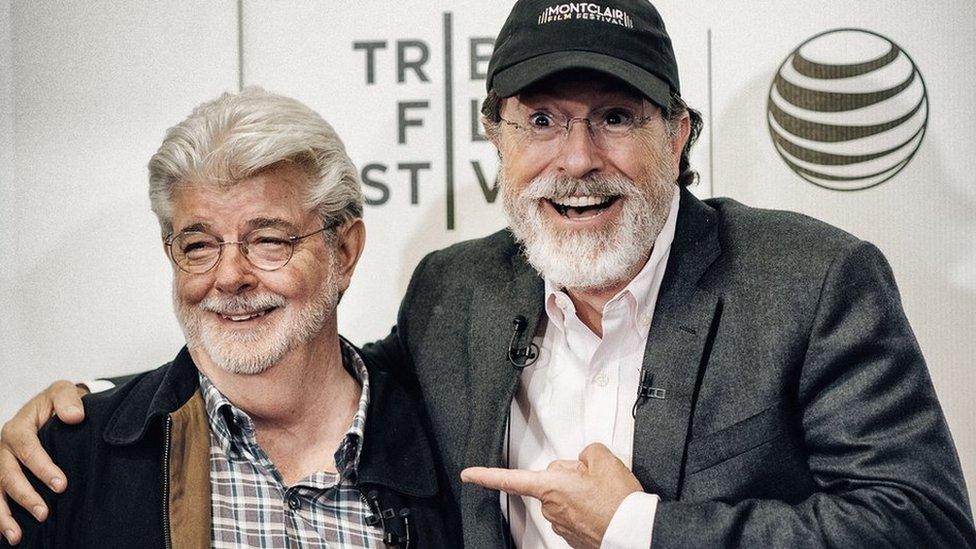
Colbert is a self-professed Star Wars "fan boy"
He's a bit of a geek
Another thing to keep in mind as Colbert works his way through his first few weeks as Late Night host is that Colbert is a nerd at heart when it comes to the sci-fi/fantasy genre - and his guest list often reflects that.
Colbert is a passionate fan of the JRR Tolkein fantasy epic The Lord of the Rings. He reportedly can speak Quenya, the fictional language of the elves used in the book, and is well versed in Tolkien lore.
He had a cameo appearance in the film The Hobbit: The Desolation of Smaug, taking advantage of a live video chat to ask director Peter Jackson about the genealogical differences between Mirkwood and Sindarin elves.
Colbert likes to boast that he was one of first to see the original Star Wars films - he won a ticket to a sneak preview when he was a child in South Carolina - and his love of the sci-fi saga has only grown since then.
He once ended a show with a faux light-sabre duel with Star Wars creator George Lucas and asked viewers to create Star Wars-themed videos based on footage of the show's host jumping around in front of a television green screen.
With a new Star Wars film in just a few months away, expect to see Colbert go into full geek mode as the premier approaches.

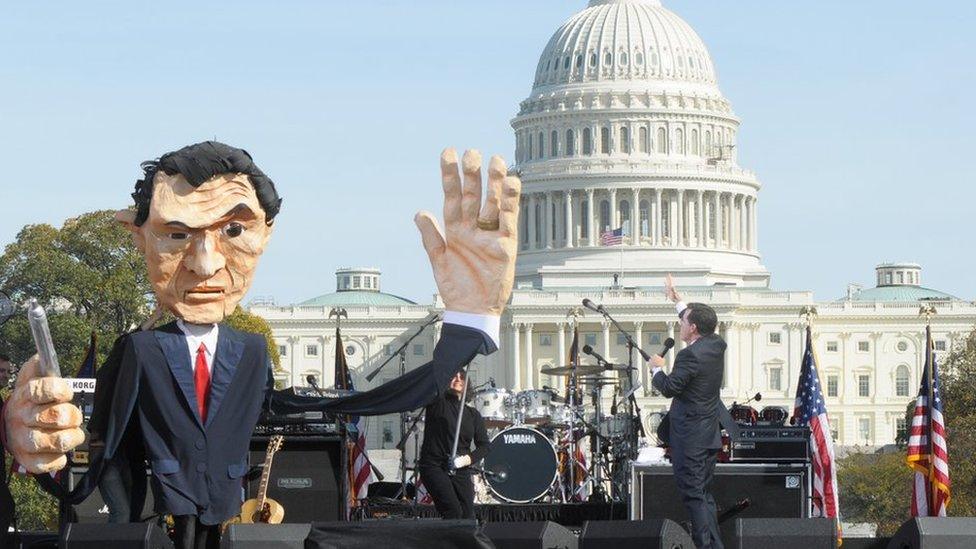
He has an interesting back story
Colbert comes from a large Southern family with 10 siblings. His childhood was marred by tragedy when, at age 10, his father and two brothers were killed in an plane crash in North Carolina. He's also totally deaf in one ear due to complications from surgery to repair a perforated eardrum.
After struggling in high school, Colbert discovered a love of acting. He graduated from Northwestern University with a degree in theatre and took a job with the well-known Chicago comedy improvisation group Second City - originally to answer phones and sell souvenirs.
He worked his way onto the troupe's touring company in 1988, then headed to New York to work for several television shows before landing a job as a correspondent on Jon Stewart's The Daily Show, where his Stephen Colbert-as-right-wing-pundit character was born.
As host of the Report, he developed a cult following. A treadmill on the International Space Station is named after him, as are four animal species, including a spider native to California, the Aptostichus stephencolberti.

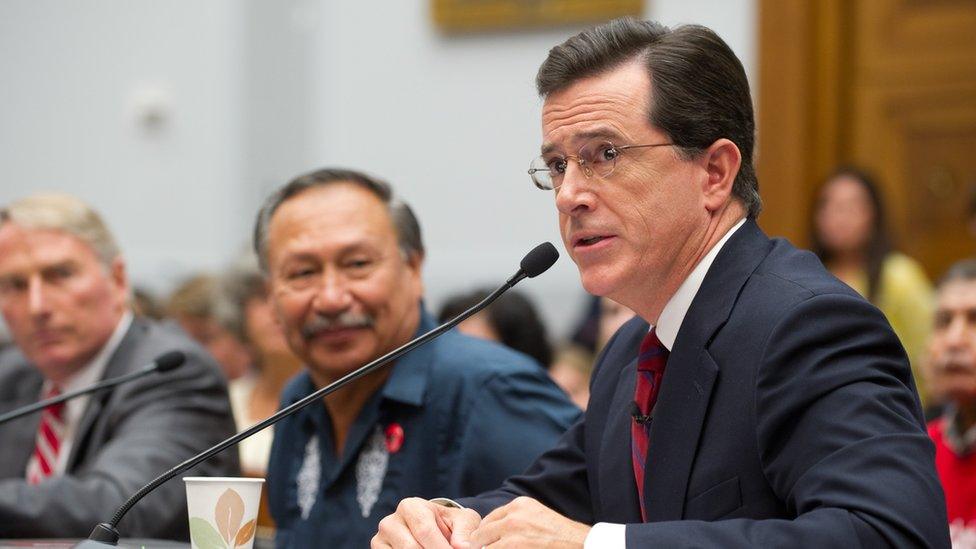
He has a serious side
Despite his comedic persona, Colbert can at times play it straight. In 2010 he put his satirical persona to a more serious use, testifying before the US Congress on expanding legal rights for undocumented migrant labourers.
"I like talking about people who don't have any power," he said in a more serious moment during questioning during a testimony that was otherwise heavily satirical. "It seems like some of the least powerful people in the US are those who come to the US and do our work and don't have any rights when they're here. And then we ask them to leave."
Like his White House Correspondents Association speech, his testimony received mixed reviews - with some conservative critics saying it demeaned the proceedings.
Throughout the course of his nine-year show, Colbert often led drives to raise money for US veterans. He spent a week broadcasting his show from Iraq and began his visit by having his head shaved under orders by President Barack Obama.
In May Colbert made headlines when he donated more than $800,000 - raised from the sale of his Colbert Report desk - to fund every public school teacher request from South Carolina made on the crowd-funding site DonorsChoose.org.
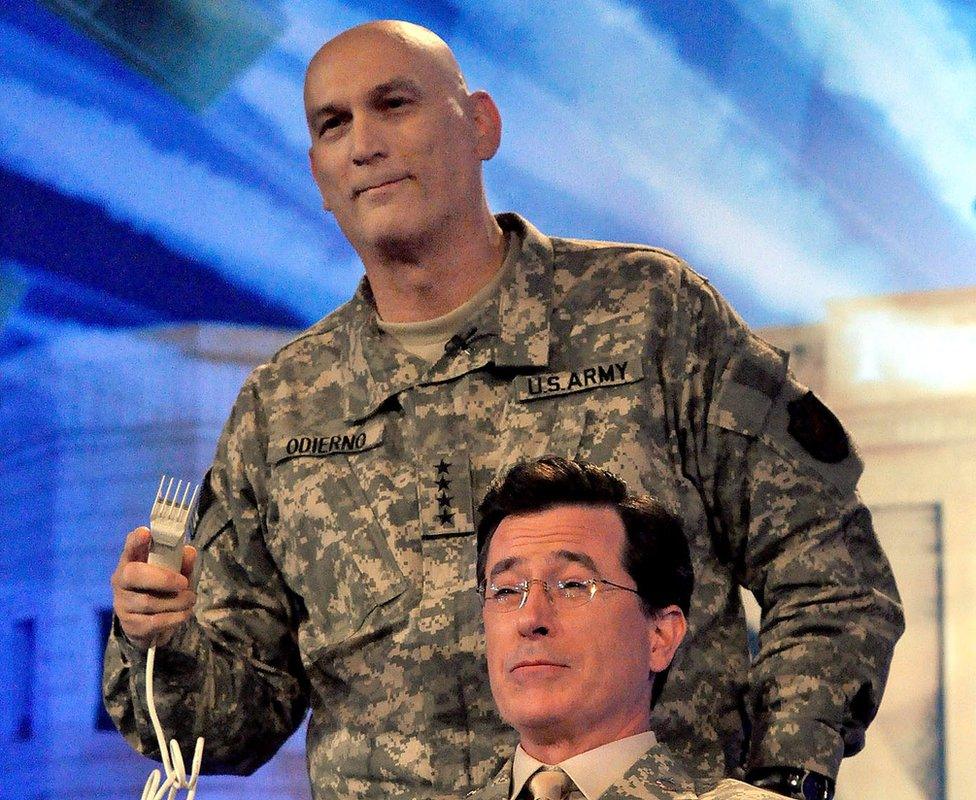
Colbert - about to shaved during his time in Iraq
Colbert is also a devout Catholic and teaches Sunday school at his local church. Some of the rare times, external he seemed to break out of character on the Report were when the topic turned to faith.
In an NPR interview in 2007, external, he explained how he answered a question from his son about the meaning of hell.
"Well, if God is love, then hell is the absence of God's love," he said. "And, can you imagine how great it is to be loved? Can you imagine how great it is to be loved fully? … And imagine if you knew that was a possibility, and then that was taken from you, and you knew that you would never be loved. Well that's hell - to be alone, and know what you've lost."
- Published10 April 2014
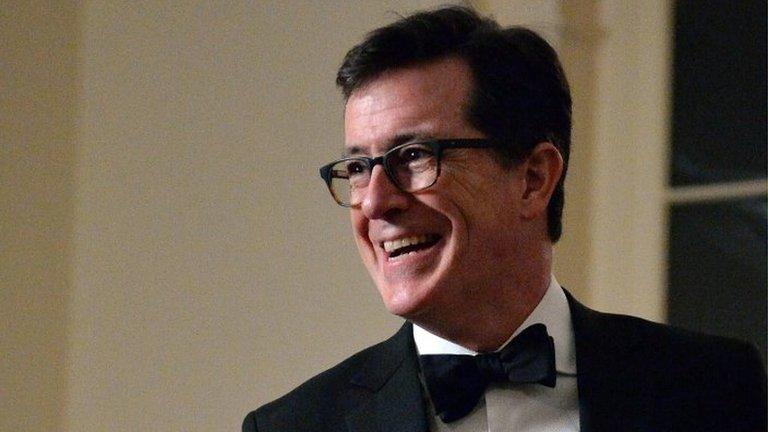
- Published19 December 2014
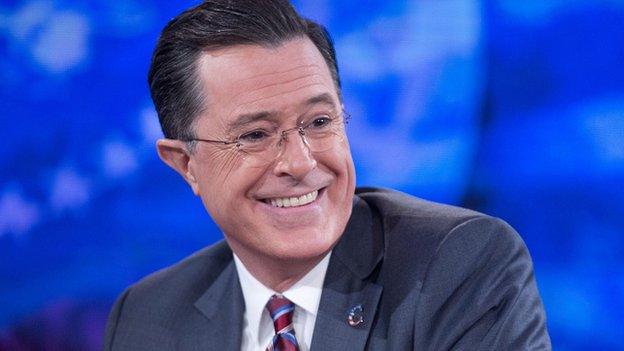
- Published28 March 2014
